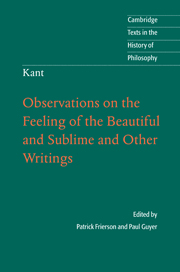Book contents
- Frontmatter
- Contents
- Introduction
- Chronology
- Further reading
- Note on the texts
- “Thoughts on the Occasion of Mr. Johann Friedrich von Funk's Untimely Death” (1760)
- Observations on the Feeling of the Beautiful and Sublime (1764)
- Remarks in the Observations on the Feeling of the Beautiful and Sublime (1764–65)
- “Essay on the Maladies of the Head” (1764)
- Inquiry Concerning the Distinctness of the Principles of Natural Theology and Morality (1764)
- M. Immanuel Kant's Announcement of the Program of his Lectures for the Winter Semester, 1765–1766 (1765)
- Herder's Notes from Kant's Lectures on Ethics (1762–64)
- Selected notes and fragments from the 1760s
- Index
- Cambridge texts in the history of philosophy
Selected notes and fragments from the 1760s
Published online by Cambridge University Press: 05 June 2012
- Frontmatter
- Contents
- Introduction
- Chronology
- Further reading
- Note on the texts
- “Thoughts on the Occasion of Mr. Johann Friedrich von Funk's Untimely Death” (1760)
- Observations on the Feeling of the Beautiful and Sublime (1764)
- Remarks in the Observations on the Feeling of the Beautiful and Sublime (1764–65)
- “Essay on the Maladies of the Head” (1764)
- Inquiry Concerning the Distinctness of the Principles of Natural Theology and Morality (1764)
- M. Immanuel Kant's Announcement of the Program of his Lectures for the Winter Semester, 1765–1766 (1765)
- Herder's Notes from Kant's Lectures on Ethics (1762–64)
- Selected notes and fragments from the 1760s
- Index
- Cambridge texts in the history of philosophy
Summary
618. 1769? (1764–68?)
The strikingly natural or naïve (later addition: in the use of the understanding, if nature appears as art, is called naïvety), the unexpectedly natural.
Poetic art is an artificial play of thoughts.
We play with thoughts if we do not labor with them, that is, are [not] necessitated by an end. One merely seeks to entertain oneself with thoughts.
For this it is necessary that all the powers of mind are set into an harmonious play. Thus they must not be a hindrance to themselves and to reason, although they must also not promote it. The play of images, of ideas, of affects and inclinations, finally of mere impressions in the division of time, of rhythm (versification) and unison (rhyme). The play of the senses is for verse [breaks off]
(Later addition: Composition. 1. Poetry. 2. Oratory: harmony of thoughts and of the imagination. B. 1. Painting and music: harmony of intuitions and sentiments, both through relation to thoughts.)
It is no labor, thus also no servitude, yet is still the knowledge of poesy. It must be counted as a merit of the poet that one learns nothing through him; he must not himself make labor out of play. Poesy is the most beautiful of all play, for it involves all of our powers of mind. It has rhythm from music. Without the measure of syllables and rhymes it is no regular play, no dance.
- Type
- Chapter
- Information
- Publisher: Cambridge University PressPrint publication year: 2011



